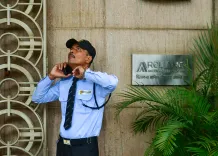Lowest Level of Foreign Ownership in South Korean Stocks Amid Trump Tariff Concerns

Synopsis
Key Takeaways
- Foreign ownership in South Korea's stock market has dropped to 31.96 percent.
- Foreign investors net sold 1.75 trillion won in January.
- Concerns about Trump's tariffs are impacting investor sentiment.
- Political uncertainty following President Yoon's martial law declaration also affects market confidence.
- The KOSPI rose 0.31 percent on Friday, reaching 2,591.05.
Seoul, Feb 16 (NationPress) In spite of the recent positive trends in the stock market, foreign ownership of South Korean equities has dropped to its lowest level in almost 18 months, according to data released on Sunday.
As of Thursday, foreign investors held 31.96 percent, equating to 676.43 trillion won ($468.53 billion), of the overall market capitalization of the Korea Composite Stock Price Index (KOSPI), as reported by Yonhap Infomax, a financial data service of Yonhap News Agency.
This represents the lowest proportion since September 20, 2023, when foreign investors owned 31.97 percent of stocks listed on the KOSPI.
In January, foreign investors were net sellers of local stocks for the sixth consecutive month. This month alone, they have offloaded a net 1.75 trillion won in stocks on the main exchange, despite the KOSPI experiencing an 8 percent increase so far this year.
The sell-offs by foreign investors have been attributed to worries regarding the implications of U.S. President Donald Trump's extensive tariffs on South Korea's industry and overall economy.
Additionally, investors continue to be cautious about the domestic political climate, following a surprising martial law declaration by now-suspended President Yoon Suk Yeol on December 3, 2024, coupled with sluggish growth prospects, experts noted.
"The tariff situation could have further ramifications for the domestic stock market, as the opportunities for South Korea to engage in negotiations with the U.S. and modify policies through high-level discussions appear limited due to current domestic conditions," stated Lee Young-won, an analyst at Heungkuk Securities.
So far this year, foreign investors have sold 1.82 trillion won worth of shares in leading company Samsung Electronics, followed by Hyundai Motor with 701 billion won, and KB Financial Group with 316 billion won, as per the data.
On Friday, the KOSPI saw a 0.31 percent increase, closing at 2,591.05, marking the highest point since October 30, 2024.








